When it comes to caravanning, the weather is often unpredictable – especially in the UK. From heavy rain and gusting winds to extreme heat and icy conditions, towing a caravan in bad weather presents unique challenges that every caravanner must be prepared for.
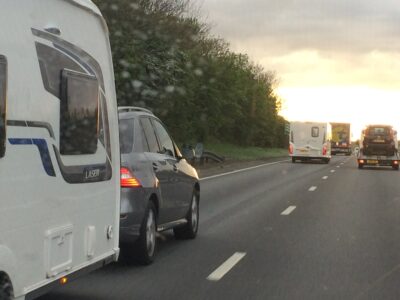
At Caravan Guard, we’ve seen how sudden changes in weather can lead to accidents and damage, which often results in caravan insurance claims for storm damage, road accidents and even flood damage after driving through flood waters.
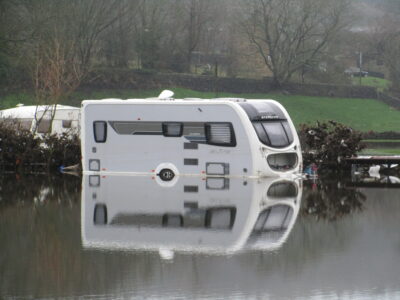
Essential towing tips to stay safe and reduce claims
To help reduce risks and keep your adventures stress-free, we’ve gathered expert tips on towing in extreme weather from Fliss The Trailer Lady, an independent driver trainer, to make sure your journey is as safe as possible, no matter what the forecast throws at you. Here are her top tips for towing a caravan in bad weather:
Vehicle and driver checks
Whether you’re towing in windy, wet, or cold weather, the key to a safe journey starts with thorough pre-departure checks on both your car and caravan.
The “FLOWER” check:
- Fuel: Make sure you have enough fuel for the journey, as delays due to bad weather can lead to detours or longer driving times
- Lights: Check that all lights on your car and caravan are clean and working
- Oil: Top up all fluids, including oil and coolant
- Water: Make sure you have enough screen wash and water for the journey
- Electrics: Make sure the car and caravan plug and socket connections are clean, secure and working
- Rubber: Check tyre pressures, age, tread depth, and condition. Don’t forget to check the wheel nut torque settings for both the car and caravan.
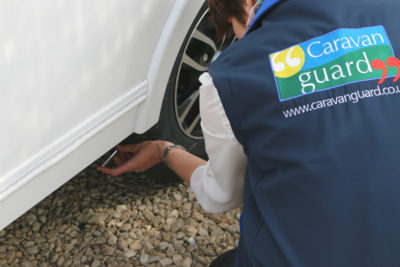
Towing mirrors
Secure towing mirrors tightly, especially in wet or windy conditions, to prevent them from slipping or falling off mid-journey.
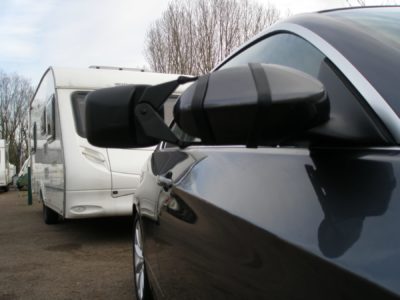
Driver readiness
A well-rested, focused driver is crucial. Avoid alcohol even the night before a trip and make sure you are fit and well to drive. Keep distractions to a minimum by securing pets and keeping children entertained and suitably restrained.

Essential towing kit
Whatever the weather, essential towing kit to have with you is:
- A first aid kit
- Hi-vis vests for the driver and passengers
- Suitable clothing for the time of year that you’re travelling
- A torch
- Blankets
- A shovel in winter
- Route planning: A sat nav that can show suitable caravan routes and an old fashioned map as a back up
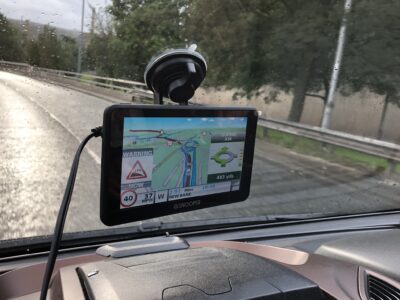
And finally, know where your tow vehicle’s towing eye is, just in case you have to be recovered, and also that your spare wheels (car and caravan) are in a good usable condition.
Towing in windy weather
Towing in windy weather can be one of the riskiest scenarios for caravanners. Sudden gusts can destabilise your caravan, increasing the chance of snaking or jack-knifing, or other road accidents.
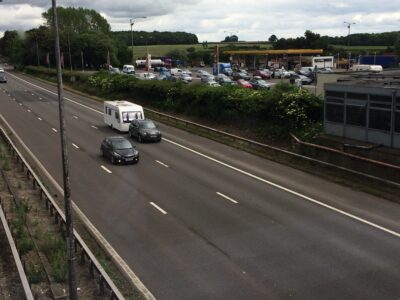
- Monitor wind speeds: Pay close attention to weather reports, particularly wind gusts. If gusts exceed safe levels, reconsider your journey.
- Avoid exposed routes: Motorways and open roads are particularly dangerous during strong winds. Choose smaller, sheltered roads instead.
- Reduce speed: Lower speeds will give you more control over your caravanning outfit. Keep both hands on the wheel to maintain stability.
- Overtaking: Be cautious when overtaking larger vehicles. Allow extra space and “keep pulling” to avoid wobbling.
If you’ve made the decision to stay on site because you’ve deemed the weather to be too dangerous to tow, then make sure you take the awning down, close all the roof vents, and even consider using the car as a windbreak for the caravan.
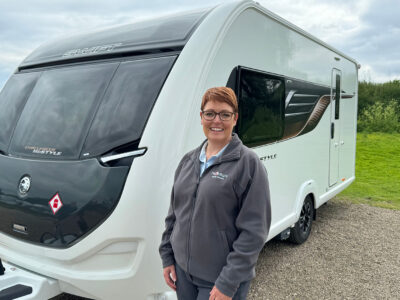
“I would strongly recommend to go and have a chat with the wardens,” said Fliss. “They may have a more sheltered pitch for you to use. They may even suggest changing the orientation of the caravan.”
If your caravan is on the driveway or in storage, and you know there’s a storm coming, there are a few things you can do to make sure it stays safe in bad weather.
Make sure you wind the hitch down low enough that the jockey wheel goes into the little cutout at the bottom of the jockey wheel to help stop the caravan moving.
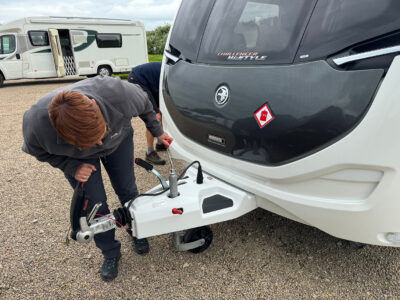
Make sure all the steadies are down, all the wheel locks are on, and the hitchlock. And if you’re using a caravan cover, double check that all the clips are closed, and that you’ve pulled all the straps as tight as possible to prevent the cover from blowing, causing damage to not only your ‘van, but possibly a caravan parked next to you.
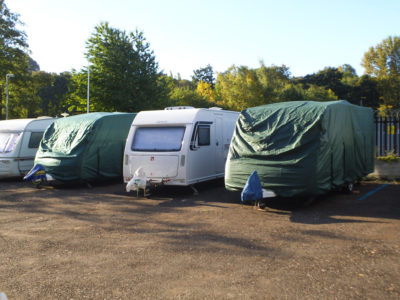
Towing in wet weather
When it comes to towing a caravan in wet weather, visibility and stopping distances are key considerations.
- Increase stopping distance: Wet roads can double your stopping time, so follow the mantra: “If you’re carrying more, give it four”— as in four seconds of space between you and the vehicle in front.
- Watch for slippery roads: After a dry spell, rain can cause roads to become particularly slippery.
- Use lights: Make sure both your car and caravan lights are on so other drivers can see you in heavy rain. Daytime running lights won’t activate your caravan’s rear lights, so manually turn them on.
- Avoid floodwater: Should you encounter an aquaplaning situation, ease off the gas, and keep a firm grip on the steering wheel. If you come across a flooded road, turn around and change your route, as you don’t know how deep that water is and your caravan could take on water which can cause irreparable damage.
Towing in foggy weather
Fog can severely reduce your visibility, making towing in foggy weather particularly challenging.
- Use fog lights: Turn on fog lights when visibility is reduced to less than 100 metres, but switch them off once visibility improves.
- Increase stopping distance: Keep a safe distance from vehicles in front so that you can anticipate any sudden braking or anything that’s going on up ahead
- Take breaks: Driving in foggy weather requires intense concentration and can be stressful, so schedule more frequent breaks to avoid driver fatigue.
Towing in hot weather
When towing in a heatwave, especially if travelling through Europe, keeping cool and staying hydrated is essential.
- Plan your travel time: Consider travelling early in the morning, late at night, or even overnight to avoid the heat.
- Stay hydrated: Make sure there’s plenty of water for you and your passengers, and wear light clothing and appropriate footwear – not flip flips or Crocs if driving!
- Pack sunglasses and a map: Make sure you’ve packed your sunglasses, especially if they’re prescription ones. Have a plan B in case the sat nav overheats by taking a roadmap.
- Watch road surfaces: Extreme heat can soften tarmac or cause newly resurfaced roads to become sticky, which can affect your handling. Remember to also clear your tyres of any road chippings before you engage your motor mover.
Towing in icy and snowy weather
Towing a caravan when the roads are icy or if it’s snowy weather requires extra caution due to slippery roads and increased stopping distances.
- Increase stopping distance: Allow up to 10 times the normal distance between you and other vehicles.
- Carry essential winter gear: A shovel, blankets, and extra screen wash are key.
- Towing cover: Using a towing cover will avoid damage to the front of your caravan from road grit.
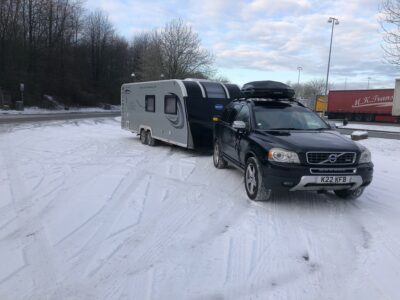
Be prepared for all weather when towing
No matter what the weather, being prepared is the most important step in staying safe, as well as slowing things down. Always check weather reports before heading off in your caravan and be prepared to be flexible with your plans. If weather conditions worsen, don’t hesitate to delay your trip or change your route.
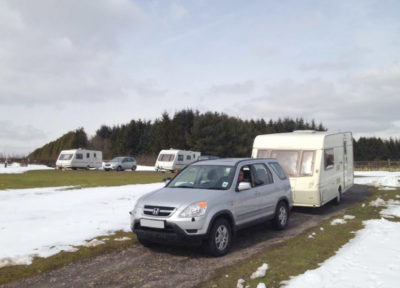
Caravan Guard provides specialist caravan insurance, including cover for storm damage, flooding, and other weather-related issues. By staying safe and taking precautions when towing in bad weather, you can reduce the risk of accidents and claims, and make sure your caravan adventures are filled with joy, not headaches.


Brilliant advise, no matter how long you’ve been towing there is always something that you weren’t aware of or had just become complacent thinking that you know it all. Very well written. Thankyou
Thanks for the great feedback Yvonne
Great advice all round, thankyou.
Can also include wiper blade condition when checking rubber!
I have been a HGV driver for 51 years, towed caravans for 50 of them and you can always learn!
Very good points made and good advise
Thanks William
No matter how experienced you are there are always things to learn and this article certainly reinforces that. Well written and very well presented. Thank you.
Thanks for the great feedback Malc
Excellent
Very informative and excellent advice given for towing safely in adverse weather conditions.
very informative – thank you….